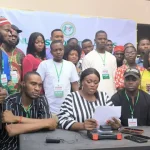Godswill Akpabio, the Senate president, stated on Monday, July 29, that the National Assembly has faced significant obstacles to the passing of measures pertaining to gender that are firmly ingrained in society, culture, religion, and the economy.
The Senate President stated that it will be challenging to close gender gaps in Nigeria unless these obstacles are removed during the commencement of a two-day workshop on gender-responsive budgeting and the role of the legislature in developing gender-responsive legislation.
Akpabio’s rise coincided with the Speaker of the House of Representatives, Hon. Abbas Tajudeen, giving an assurance that the House would see to it that all gender-related laws that were blocked during the 9th Assembly’s constitutional amendment process are passed.
The Senate President, who was represented by Senator Sunday Karimi, expressed sorrow that the five gender bills that were submitted to the 9th National Assembly in 2022—the most recent measures that could have significantly advanced gender equality and equity—were all rejected.
He said: “Breaking these barriers demands huge investments in gender-responsive legislation and budgeting as the take-off point. And we must be intentional about it. This is because the role of gender-responsive legislation and budgeting in addressing gender gaps in governance and development cannot be overemphasized.
“On the one hand, gender-responsive legislation deals with strategies that make legislation to work for both men and women. In other words, gender-responsive legislation makes legislative systems more responsive to explicit and implicit gender issues.
“It facilitates accountability – in legislative and policy implementation – to the specific needs of different sexes and different gendered perspectives on pivotal social, economic and political issues.
“Gender-responsive budgeting, on the other hand, is a strategy that creates budgets that work for everyone in a fairly equitable manner –male and female. It must be without any forms of discrimination, marginalisation or exclusion. In both instances, the main emphasis is on paying adequate attention to the unique and diverse needs of every person in law-making and budgeting.
“By implication, gender-responsive legislation and budgeting can help to identify gender gaps and inequalities and create opportunities for addressing them. If attained, both can engender a sense of fairness, equity and justice, generate a sense of belonging among all; and contribute to the alignment of national budgets with Sustainable Development Goals (SDGs).”
According to Akpabio, it is crucial to concentrate on potential legislative remedies to address this unsolvable and seemingly never-ending problem of gender parity, or, more accurately, women’s political engagement and representation in Nigerian governance.
According to him, the workshop’s results will influence the way the Constitution Amendment Committee talks about gender issues.
He stated that advocating for gender-responsive budgeting and legislation is a true sign of a commitment to gender mainstreaming and that gender issues are a matter of governance and development that can never be fully addressed by one organization.
According to him, the gender issue has dominated scholarly, policy, and advocacy efforts for decades and is likely to do so for some time to come due to the historical underrepresentation of women in development and governance. Even though the majority of nations profess to be democratic, most of them have very low levels of inclusion.
He stated that the National Assembly will use all of the legislative tools and resources at their disposal to support the realization of this ambitious goal.
The National Assembly is interested in advancing gender equity because they recognize its implications for sustainable governance, security, and development.
He promised that gender-related bills would be passed quickly as soon as they were received, adding, “We also have the ability and connections to lobby the administration on this crucial issue. You may be confident that President Bola Ahmed Tinubu is aware of these facts.
“Moreover, gender equity is a critical component of the overall priority of the Renewed Hope Agenda of his government.
“In the agenda, gender equity is considered as one of the long-term, lasting solutions to the political, economic and social challenges facing the country.
“The government is on course in this regard.
“As a responsible parliament, the 10th Assembly under my leadership will also act in solidarity with women caucus of the National and State Assemblies in their rightful demand for improved representation in governance, both symbolically and substantively.”
Speaker Abbas Tajudeen, on his part, stated that the House committee’s current effort to review the constitution is offering a forum and starting conversations on the same subject in order to suggest the best model for the Nigerian legislative regarding women’s representation and involvement in government.
He noted that although women’s agitation for equal participation in governance has long existed, it erupted into a more heated debate following the Beijing Conference of 1995, whereby it was demanded that thirty-five percent (35%) of women be represented in governance.
Since then, he claimed, other nations have taken various tacks to achieve or even surpass the objective of affirmative action. One tactic to forward the direction of gender-responsive legislation is gender-responsive budgeting.
Abbas said: “Nigeria joined the rest of the world to ensure women’s inclusion in governance with the National Gender Policy (NGP) initiated in 2006 with a Strategic Implementation Framework from 2008 to 2013.
“The main objective was to ensure gender equality, the empowerment of women and women’s human rights. For the last nine years, there has been a deliberate policy and focus on gender issues by the government.”
For example, prior to President Muhammadu Buhari’s departure in 2023, the Federal government of Nigeria established a new gender policy that would run from 2021 to 2026 and set new minimum standards that the Nigerian government must accomplish in order to fulfill its mandate for gender equality.
“It must be noted that President Bola Ahmed Tinubu is making conscious efforts to align with the new gender policy, especially with the number of women appointed into Executive Council and Department and Agencies of government, while it is hoped that new appointment of women will further expand the inclusion of women in the governance process.
“This government has been very deliberate on this and it is reflected in all government programmes and activities that women are taking the center stage.
“However, despite the notable successes in mainstreaming gender equality in Nigeria, the number of women participating in the decision-making process at formal and informal levels still needs more attention.
“Women are not only underrepresented politically but equally continue to hold the shorter end of the stick even in the private sector, religious organisations, and community and village governance. Male chauvinism continues to derail the democratic ethos of inclusion and participation.”
Nigeria is not an exception when it comes to the importance of gender equality, particularly with regard to women’s political participation. Very significant gender disparities still exist in many facets of our society, notwithstanding recent progress.
“Women and girls still face challenges in accessing education, healthcare, economic opportunities, and political representation. Discriminatory cultural norms and practices, limited access to resources and decision-making processes, as well as violence against women, contribute to these inequalities.
“When we thought that the new gender policy was already receiving attention from the government for improved participation of women in decision-making processes, the 2023 general election was a major setback.
“How do we explain that out of the 469 seats in the National Assembly, the 10th Assembly has only 3.91% women’s representation? This is significantly low when compared to other African countries.
“It is, therefore, a matter of urgency to advance gender-responsive Legislature and the 10th House of Representatives is taking this seriously. It requires increasing female participation in democracy and the Legislature and for female legislators to play strategic roles in the parliament.
Women still confront obstacles to our social, economic, and political well-being, according to Hon. Kagilat Ogbara, chairman of the House Committee on Women’s Affairs and Social Development.
According to her, women’s average income, labor force participation rate, education attainment, and access to resources and opportunities are all lower than those of men. Women also have a lower Human Development Index than men.
She emphasized that our attempts to influence policy decisions and have our interests taken into account by the government are still being undermined by the trend of women’s decreasing representation and engagement in governance.




